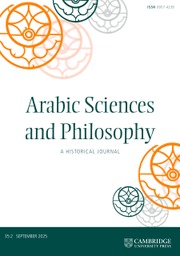Article contents
AL-RĀZĪ ON THE THEOLOGIANS’ MATERIALISM
Published online by Cambridge University Press: 07 February 2023
Abstract
Late in his intellectual life, Faḫr al-Dīn al-Rāzī espoused a dualistic position on the nature of the soul, denying that the soul is in any sense a material body. This view, which in broad terms concurs with Avicenna’s, sets al-Rāzī in opposition to the theologians’ materialistic stance. To make his position clear, in his last work Almaṭālib al-Rāzī sets out a comprehensive case for the theologians’ materialism, before critiquing that position. This paper offers a reconstruction of al-Rāzī’s arguments for the theologians’ materialism, providing an insight into arguments in the philosophy of mind during the Islamic Middle Ages.
Résumé
Tard dans sa vie intellectuelle, Faḫr al-Dīn al-Rāzī a adopté une position dualiste sur la nature de l’âme, niant que l’âme est en tout sens un corps matériel. Ce point de vue, qui, de manière générale, concorde avec celui d’Avicenne, oppose al-Rāzī à la position matérialiste des théologiens. Pour clarifier sa position, dans son dernier ouvrage, Al-maṭālib, al-Rāzī expose un argument approfondi en faveur du matérialisme des théologiens, avant de critiquer cette position. Cet article offre une reconstruction des arguments d’al-Rāzī en faveur du matérialisme des théologiens, offrant une perception des arguments dans la philosophie de l’esprit pendant le Moyen Âge islamique.
- Type
- Research Article
- Information
- Creative Commons
- This is an Open Access article, distributed under the terms of the Creative Commons Attribution licence (https://creativecommons.org/licenses/by/4.0/), which permits unrestricted re-use, distribution, and reproduction in any medium, provided the original work is properly cited.
- Copyright
- Copyright © The Author(s), 2023. Published by Cambridge University Press
- 1
- Cited by




